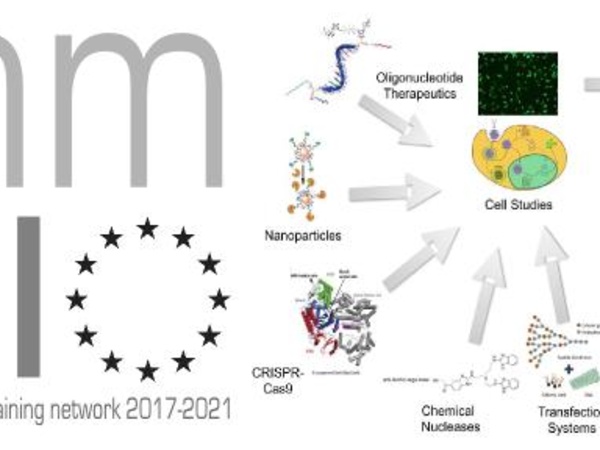MMBio - H2020 ITN

Molecular Tools for Nucleic Acid Manipulation for Biological Intervention (MMBio)
MMBio is a Marie Curie Initial Training Network set up to provide young researchers with hands-on research experience and formal training in the classically separate disciplines of Chemistry and Biology in twelve European partner groups: eight academic groups, one medical school and three companies.
The objective of MMBio is to develop enabling technologies to ultimately cure cellular disease phenotypes by employing molecular, chemical and biological approaches to interfere with gene expression precisely and selectively. MMBio will focus on unconventional new therapeutic approaches, namely “genetic” drugs that are typically based on oligonucleotides (ONs). Reaching these objectives will include multiple skills of Chemical Biology: synthetic chemistry, quantitative mechanistic analysis of recognition and catalysis, high-throughput screening in microfluidic systems, work with nanoparticles and directed evolution of enzymes.
Fifteen fully-funded PhD studentship started in January 2017. Students interested in joining the programme should email the groups in which they would like to work (see table below) with a description of their background and interests, a CV, their academic record (with marks) and the names of two referees who can comment on their scientific track record. Applicants must have at least a 2.1 in Chemistry, Biochemistry or a related subject. The only formal restriction is that you have to undertake the PhD programme in a country where you have not been resident in the past five years. You should apply as soon as possible directly to the partner group that you wish to work in.
Note: This ITN has now closed and the ESRs (Early stage researched) have all successfully completed their PhDs.
Research in this network is centred around a basic and quantitative understanding of chemical interactions to develop and deliver oligonucleotide molecules of utility for therapy. To this end we will design systems to interfere therapeutically with gene expression in living cells. We combine expertise in nucleic acid synthesis, its molecular recognition and chemical reactivity with research in drug delivery, cellular biology and experimental medicine.
Note: The MMbio ITN PhD projects were presented at the MMBio Summer School organised by the Karolinska Institute, 18-25 June 2018.
Training is highly interdisciplinary in nature: workshops and regular network meetings will provide a venue to command a much broader chemical biology skill set than usual, encompassing organic synthesis, quantitative mechanistyic analysis, directed enzyme evolution, cell biology, genetics, microfluidic engineering and experimental medicine. The training programme builds on two previous Marie-Curie initiatives, ENDEVAN, coordinated by Prof. A. J. Kirby FRS, and PhosChemRec.
Technology Transfer. Research and training in this area strongly interface basic research with industrial applications. Ultimately our understanding of the basic science of nucleic acid manipulation should lead to useful applications on the long term, e.g. to artificial nucleases, with potential roles in gene regulation, if efficient catalysis can be combined with selective recognition. Crucially for therapeutic success these reagents have to be delivered into the cell, which is why delivery issues are also addressed. The incorporation of industrial partners (AstraZeneca, MedImmune, RISE) ensures that the full life-span of drug development is covered in this training programme – and may provide a conduit for utilising and marketing the results of this collaborative programme. The training programme encompasses courses on IP protection, the research-to-market process and case studies of successful spin-outs - as well as science communication.
MMBio comprises twelve partner groups:
| short name | Principal Investigator | Affiliation |
| UCAM | Prof Florian Hollfelder | Dept of Biochemistry, University of Cambridge, UK |
| UNIPD | Prof Paolo Scrimin Prof Fabrizio Mancin | Dept of Chemical Sciences, University of Padua, Italy |
| KI | Prof Roger Stromberg | Dept of Organic and Bioorganic Chemistry, Karolinska Institutet, Sweden |
| SLL | Prof Edvard Smith | Dept of Molecular Genetics, Karolinska Institutet, Sweden & Stockholms Laens Landsting |
| UT | Dr Tuomas Lönnberg | Dept of Chemistry, Turun Yliopisto, Finland |
| USFD | Prof Nick Williams | Dept of Chemistry, University of Sheffield, UK |
| UGENT | Prof Dr Annemieke Madder | Dept of Organic Chemistry, Universiteit Gent, Belgium |
| JWGU | Prof Dr Michael Göbel | Dept of Organic Chemistry and Chemical Biology, Goethe-Universität Frankfurt, Germany |
| RISE | Dr Ulf Tedebark | SP Process Development, Dept of Chemistry, Materials and Surfaces |
| UBE | Prof Tamis Darbre | Dept of Organic Chemistry & Biochemistry, Universität Bern, Switzerland |
| MEDI | Dr Mike Snaith | Antibody Discovery and Protein Engineering, MedImmune, UK |
| AZ | Dr Shalini Andersson | Cardiovascular and Metabolic Diseases, AstraZeneca, Gothenburg, Sweden |
The research leading to the results in these web pages has received funding from the European Union's Horizon 2020 Framework Programme (under REA grant agreement n° 721613). This material reflects only the author’s views and the Union is not liable for any use that may be made of the information contained therein.
